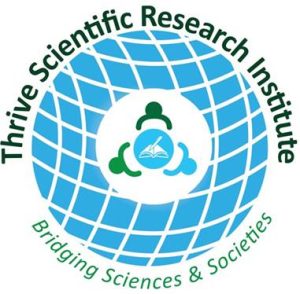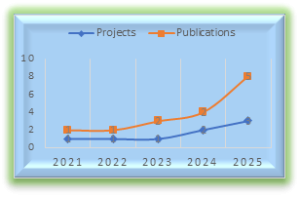
Vision
To be a leading institution in innovative scientific research for transformative change.
Mission
To create a nurturing environment where scholars grounded in interdisciplinarity conduct research and engage in innovative dialogue at multidisciplinary platforms to address issues confronting societies, while contributing to improved quality of life.
Object of TRISU
While related activities started in 2021, TRISU officially began in 2024 to institutionalize activities in the domain of innovative scientific research.
Under TRISU, basic, applied, and action research are conducted, aimed at transformative change. This change is expected in both fundamental elements of the scientific community and societies concerned with scientific findings, i.e., social transformation. Social transformation is facilitated by developing the research question(s) with those involved. This forms part of our research life, focused on the change needed in the real world rather than concentrating on mere academic pursuits.
Genesis, evolution, and philosophy
Initially, a research lab (formerly DOBOLE RESEARCH LAB) was dedicated to scientific research at the then Thrive Development Facility (TDF), now THRAIF. At the transition to THRAIF. This lab has evolved and transformed into TRISU and is on the path to higher levels. One of the core values, determined over time, is the philanthropic nature of science and scientific innovations geared towards
improving society. As such, doing science and every intellectual endeavor corresponds to a gift of nature, and thus, sciences and science institutions are and should be humanitarian.
Based on that, our philosophy has been refined: science(s) should be responsible to societies in their specific contexts, taking each endogenous knowledge as a micro-university in itself. Our research stance has evolved to hinge on an endogenous development approach, co-creating the research question(s) with stakeholders under investigation. Driven by the consistent emergence of local and indigenous knowledge, crucial in creating endogenous innovations in various contexts, we firmly believe that knowledge production is part of society, i.e., societies act like micro-universities. As such, while we owe responsibility to the scientific community, we are equally accountable to society, i.e., we have evolved to become responsible for our findings to specific micro-universities, i.e., specific local contexts.
- Thematic focus and objectives
The objectives of TRISU have been revised over time. TRISU incorporates all objectives of any research institution, e.g., a research university, but goes above and beyond that, considering that it aims to be a fundamental transformational change in the real world, rather than mere academic pursuits. That is to say, TRIUS incorporates all elements of a research university but focuses on transformative change in the real world. Bearing that in mind, TRISU has the following specific program areas and objectives:
i). SCIENTIFIC RESEARCH: Conduct innovative research in all forms of science, including – but not limited to – field, lab, and other forms of research. This also involves linking researchers to practice and vice versa in the context of understanding and tackling risk from societal, social, and natural hazards.
Here, we connect researchers from various academic institutions within and outside Uganda to conduct a research-based internship at our premises or in the field with the groups, some of whom are members of Through us, the researcher can thus interact in the framework of a living lab with the local lived experiences.
ii). SCIENCE AND COMMUNITY OUTREACH: Conduct and implement various platforms for sharing scientific research outputs and engagement of human communities in the best ways to optimize and do things differently and better.
iii). SCHOLARLY SCIENCE COMMUNICATION: Establish and implement scientific knowledge platforms and participate in existing ones in the scientific community. This also includes hosting conferences to communicate science to society and enable society to engage with science vigorously
iv). OPTIMAL RESEARCH ENVIRONMENT: Develop an optimal research environment to support researchers in producing high-quality research and innovations. This includes hosting researchers and providing mentorships for those conducting high-quality scientific research. We have labs and supportive ICT services.
v). RESEARCH CONSULTANCY, INNOVATIONS, AND TECHNOLOGY DEVELOPMENT: Conduct specialized research to develop innovations and innovative technologies, including on behalf of other entities. This also includes examining scientific products, such as dissertations. We also support the development of research units in institutions.
vi). SCIENCE-BASED ADVISORY SERVICES: Provide a platform for the community and other sectors of society to benefit from evidence-based advice on matters of concern and/or issues confronting society.
vii). Conduct any other activities incidental to a scientific research institution.
Projects
TRISU
We offer Training workshops in various aspects of scientific research, including
- Gap Analysis and Problem Statement |Every (last) Friday.
- Dissertation and Systematic Review |Every last Wednesday & Thursday.
- Developing & Executing a Rigorous Research Methodology |Every last Thursday of the month.
- Data Analysis (Statistical & nonstatistical) | Every last Saturday or in a camp.
- Statistical Mentorship |Every Tuesday & Wednesday (Eve.)
6. Scholarly Writing – Original articles |three consecutive Mondays (Eve.).
7. Scholarly Writing – Systematic review articles | three consecutive Tuesdays (Eve.)
8. Scholarly Writing – Perspective or Opinion article | three consecutive Wednesdays (Eve.)
9. Scholarly Writing – Edited volume chapter or monograph | First Wednesdays of the month
10. Upcoming Scholars Course (retooling you on reading and writing scholarly) | offered quarters, each 15 days.
Statistics of some outputs

